A little while ago Hollis Mulwray declared that Argo‘s Alan Arkin was SAG-nominated for Best Supporting Actor because he’s become “the pet of the Oscar geezers.” I really like that phrase and I hope it sticks to the wall. For years and perhaps decades to come this or that over-65 favorite can be jovially referred to as “a pet of the Oscar geezers.” This is coinage, what we all live for. Some day Mulwray will talk to a girl in a Pavillions aisle or at a bar and he can say “I’m actually the ‘pet of the Oscar geezers’ guy…yeah, it was me.”
SAG Nom Hugs, Blowoffs
Due respect to the admirable Nicole Kidman, but her Best Supporting Actress SAG nomination for The Paperboy, announced this morning, is, to say the least, a curious call. The Paperboy is an appallingly bad film, and Kidman’s performance as a lacquered, sexed-up Florida floozie is, at best, a tawdry, campy thing. It’s especially regrettable with SAG voters failing to nominate The Master‘s Amy Adams, Silver Linings Playbook‘s Jacki Weaver, Compliance‘s Ann Dowd and/or Arbitrage‘s Susan Sarandon — all far more deserving of a nomination.
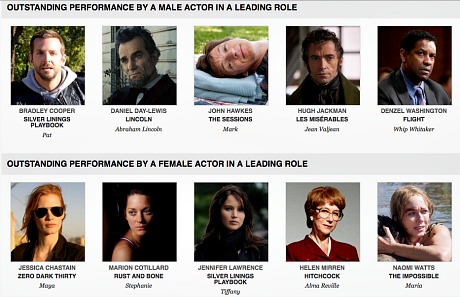
For Best Actor, SAG nominated Lincoln‘s Daniel Day-Lewis (of course), Flight‘s Denzel Washington, The Sessions‘ John Hawkes (fully deserved), Les Miserables‘ Hugh Jackman (which Glenn Kenny will agree with) and Silver Linings Playbook‘s Bradley Cooper (completely deserved up and down). The Master‘s Joaquin Phoenix was blown off, presumably because his imitation of a booze-sipping alien serpent in Paul Thomas Anderson‘s film struck too many SAG voters as egocentric or weird for weird’s sake or whatever. That or his screw-the-Oscars rants did him in. But I’ll never forget his Freddy performance. Tattooed on my brain.
Poor Richard Gere, who gave one of the best two or three performances of his career in Nic Jarecki‘s Arbitrage, didn’t make the cut. Amour‘s Jean-Louis Trintignant was also nudged pushed out onto the fire escape.
SAG’s Best Actress nominees included Zero Dark Thirty‘s Jessica Chastain (a cinch), Silver Linings Playbook‘s Jennifer Lawrence (natch), Hitchcock‘s Helen Mirren, Rust & Bone‘s Marion Cotillard and…The Impossible‘s Naomi Watts? Due respect but Watts overacts (too much crying, not enough steely adrenaline) in Juan Antonio Bayona‘s technically admirable film. In place of Watts SAG should have nominated Anna Karenina‘s Keira Knightley or Amour‘s Emannuelle Riva.
SAG Best Supporting Actor nominees include Lincoln‘s Tommy Lee Jones (agreed), Argo‘s Alan Arkin (because he delivers funny lines in his usual deadpan way), Silver Linings Playbook’s Robert De Niro, The Master‘s Philip Seymour Hoffman and — a surprise but fully deserved — Skyfall‘s Javier Bardem. Due respect but I would have I have nominated Matthew McConaguhey in place of Arkin. I have no quarrel at all with SAG ignoring the Django Unchained guys (Christoph Waltz, Leonardo DiCaprio, Samuel L. Jackson) in this category. The movie is mostly cheap dogshit and all these guys do is prance & strut around in Quentinworld.
What about the John Goodman blowoff? Not too long ago I had him pegged for a probable Best Supporting Actor nomination because of two highly likable, big-sell performances — a swaggering, self-amused drug dealer in Flight (his second entrance has audiences cheering) and as amiable makeup artist John Chambers (a real guy who died in ’01) in Argo. Plus he plays a highly sympathetic Atlanta Braves front-office guy who cares a good deal for Clint Eastwood‘s aging scout in Trouble With The Curve. Plus he’s lost all that weight. At least a nomination, right? Nope. What happened here? Was that Xan Brooks Guardian interview partly to blame?
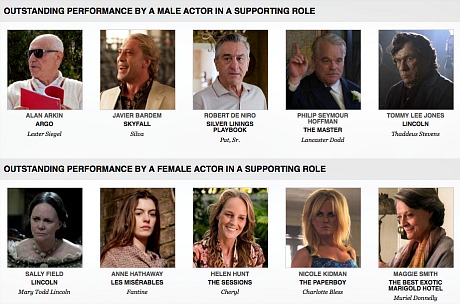

Move On
A month goes by and I don’t pay attention to this Side Effects trailer until today. What is that? I know I’m going to love it (Rooney Mara frazzled about impending release from jail of creepy husband Channing Tatum) because it’s from director Steven Soderbergh and screenwriter Scott Z. Burns, and formerly called The Bitter Pill. Jude Law, Catherine Zeta-Jones and Vinessa Shaw costarring. Opens on 2.8.13 through Open Road.
2012 is over and Lincoln is probably going to win Best Picture. I can’t stand it. I don’t want to think about it any more. I just want to focus on January and February releases and on the Sundance, Santa Barbara and Berlin film festivals.
Dumbest, Most Mule-Stubborn Demo in U.S. History
From the mind of Joe Bomowski, posted yesterday at 1:10 pm: “This is independent of AFI and Silver Linings PLaybook‘s awards momentum, but in terms of JW thinking that SLP should or could be a bigger mainstream juggernaut than it actually is, consider this gem from a loud female coworker: “I like Bradley and I like Jennifer, but I don’t know if I like them together…not sure if I need to see this.”
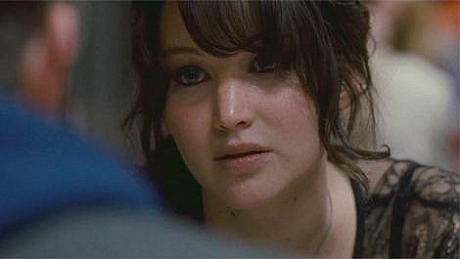
“This in some weird way is how women process movies. As a guy, as a movie fan, it’s totally alien to me, but women have these imprecise signifiers letting them know if a movie is ‘safe’ for them. It’s based on their real-life behavior (“Eww, I do NOT LIKE so-and-so because he cheated on so-and-so”) and their INTERVIEW DEMEANOR on talk shows, on the fashions they wear in magazine shoots. And they refer to the actors by their first names. Their TV friends Bradley and Jennifer from Kimmel and Stewart. It’s so bizarre.”
Wells: To borrow from Laurence Olivier‘s Christian Zell in John Schlesinger‘s Marathon Man, “Is it safe?”
Back to Bomowski: “I know that a feminist critic like Sasha Stone will deny a generalization like that, but look at the MINEFIELD of obstacles any movie has to work through to get to HER sweet spot. It’s undeniable. Jeff wasn’t entirely wrong to think SLP could be a crowd-pleaser, but when it comes to a romcom first and foremost you’ve gotta get the female vote, and something imperceptible to male critics, bloggers, and fans of SLP is ringing in women’s ears telling them there’s something ‘off’ about it, and that and it doesn’t have a non-threatening female lead finding out she can have her ad agency job AND the perfect guy!
“It’s kind of the world’s first sausage-fest romantic comedy in ages — I really only hear guys talking it up, and it’s usually guys who are AWESOME alpha-male blowhards like Wells or yours truly. Thus far, to bring it full circle, this doesn’t have the ‘campy chicks at the office water cooler listening to ’80s Rewind talking it up at the water cooler’ enthusiasm.”
Extra: Here‘s an excellent second-look appraisal by Rope of Silicon‘s Brad Brevet in which he addresses some complaints.
Thorny Real-Life Maya
“She’s not Miss Congeniality, but that’s not going to find Osama bin Laden,” says a former CIA associate who knows the real-life “Maya,” the flinty character played by Jessica Chastain in Zero Dark Thirty. This source and others are quoted in a 2.10 Washington Post piece about the CIA analyst whose contributions to the bin Laden hunt were crucial,” reports Mark Miller.

The Zero Dark Thirty attention has “sent waves of envy through the agency’s ranks.”
The real Maya’s “defenders say the operative has been treated unfairly, and even her critics acknowledge that her contributions to the bin Laden hunt were crucial. But the developments have cast a cloud over a career that is about to be bathed in the sort of cinematic glow ordinarily reserved for fictional Hollywood spies.
“The character Maya, which is not the CIA operative’s real name, is portrayed as a gifted operative who spent years pursuing her conviction that al-Qaeda’s courier network would lead to bin Laden, a conviction that proved correct.
“At one point in the film, after a female colleague is killed in an attack on a CIA compound in Afghanistan, Maya describes her purpose in near-messianic terms: ‘I believe I was spared so I could finish the job.’
“Colleagues said the on-screen depiction captures the woman’s dedication and combative temperament.”
Reported Biggy-Boal Shift
I’ll talk about alleged or supposed private stuff between acquaintances or filmmakers or whomever until the cows come home, but I never write about it. And so yes, I agree that it’s little bit icky to get into this but I did coin the power-couple term “Biggy-Boal” so I feel I have to riff on this somehow. The fact is that Buzzfeed‘s Kate Aurthur has reported today that a certain aspect of the partnership known as Biggy-Boal is no more.
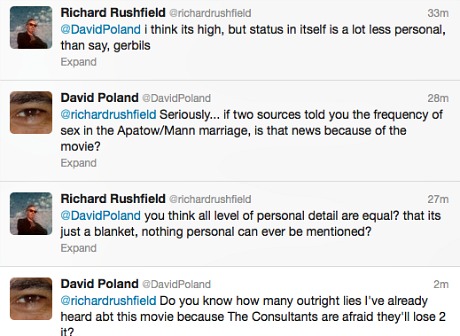
In her words: “Sources who know Bigelow and Boal are saying they are no longer together and are trying to keep that quiet as they promote [Zero Dark Thirty].”
“At best, their togetherness is a manifestation of a productive working team,” Aurthur writes. “At worst, Bigelow, a woman, needs Boal, a male investigative journalist, to add legitimacy to her hard-hitting films. Perhaps it’s both.” Wells: Of course it’s both!
“In a two-day-old New York piece about their partnership, Mark Harris “asked the two of them about whether they planned to collaborate again and noted, ‘Across the table, they exchange, not for the first time, a let’s-coordinate-our-answers glance.’ And then Boal said, ‘I think we both want to…it’s up to the movie gods.”
“‘For his part, Boal seems to be moving on — on Monday, he announced he’s forming his own company, Page One Productions, to adapt reporters’ stories into films. Bigelow is not involved.”
Another except from the Harris article:
“Bigelow’s partnership with Boal, who met her about ten years ago when she inquired about a story he’d written for Playboy, has taken her into new and rewarding territory, his journalistic cred a complement to her unsentimental, realist aesthetic. Their collaboration — she calls herself ‘a delivery system for Mark’s content‘ — is so intense that many assume it is, or was, romantic, something the two have never acknowledged, denied, or discussed. In conversation, that intensity is something to behold.”
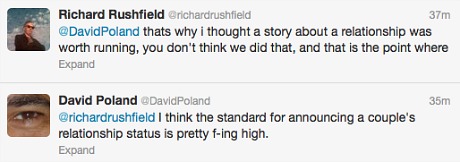
Tall Glass of Water
For whatever embarassing reason the Raymond Chandler-invented expression “tall glass of water” never crossed my path until last Saturday when Mel Gibson used it to describe Kathryn Bigelow and I said “good one…is that yours?” and he said “hell, man…you don’t know your Chandler” and proceeded to shpiel on it. It means not just tall, of course, but a person of considerable character, history and overall content who, if you really want to know her, requires a fair amount of slow sipping, tasting, contemplating and so on.
Small Potatoes
Another instance of pathetic, low-class, self-destructive behavior. Being an adult requires simple, constant applications of self-control, often small but sometimes difficult, and if that’s not in your quiver then you might as well pack it in. On the other hand, why did this never happen to me or my friends when we were 15 or 16?
Why does this kind of thing seem to be a 21st Century phenomenon? Is it a metaphor for the fraying of the social fabric and the sociopathic celebration of self-worshipping impulse? If so, I honestly wish (and I’m not trying to sound like a grunting thoughtless animal) I could have partaken when I had the chance. I had it so rough as a lad of 15 or 16. It’s difficult to even think back on it.
Status-Quo Default Preferences
For their forthcoming Critics Choice Awards, the Broadcast Film Critics Association (which I’m a mixed-emotions member of) has given 13 nominations to Steven Spielberg‘s Lincoln, 11 to Tom Hooper‘s Les Miserables, 10 to David O. Russell‘s Silver Linings Playbook and 9 to Life of Pi. I’m a fan of the final 40 minutes of Les Miserables so I can partially support or sympathize with the accolades, but the Lincoln thing has sent me into the pit. This organization has been trained like dogs to respond to certain prompts and commands, and they’re doing exactly what’s expected of them.
Neverending Burden
If this indicates Zak Snyder‘s approach to Man of Steel then I feel an emotional deflation coming on. From the soundtrack, at least. Male choral singing in Crimson Tide, okay. Titanic-styled choral singing here…to what end? An attempt to nudge if not goad the audience into spiritually reinvesting in a spent comic-book fable that began the year that Angels With Dirty Faces was released? Greenlighted solely because of brand familiarity and therefore a presumed lock to appeal to Joe and Jane Popcorn?
A second reboot of an iconic franchise that began as a kind of remake (certainly an ongoing reimagining) in 1978 with the Chris Reeve series…eyes flat, pulse weak. This is Big Brother-ism.

